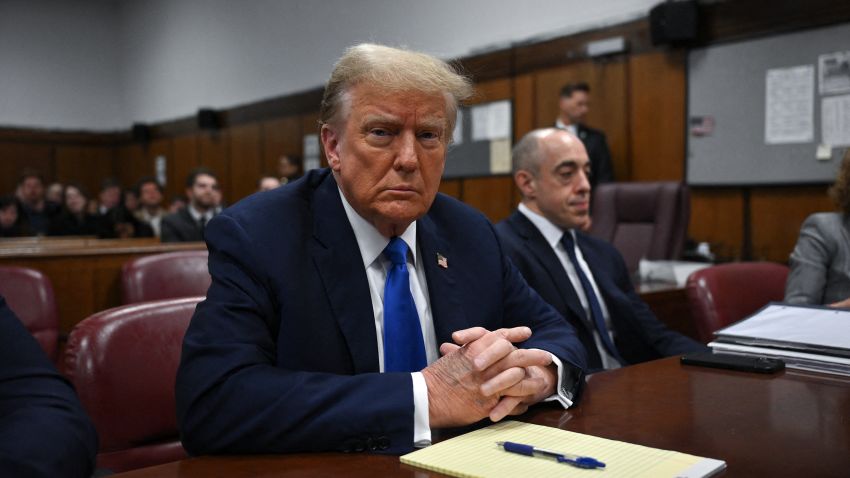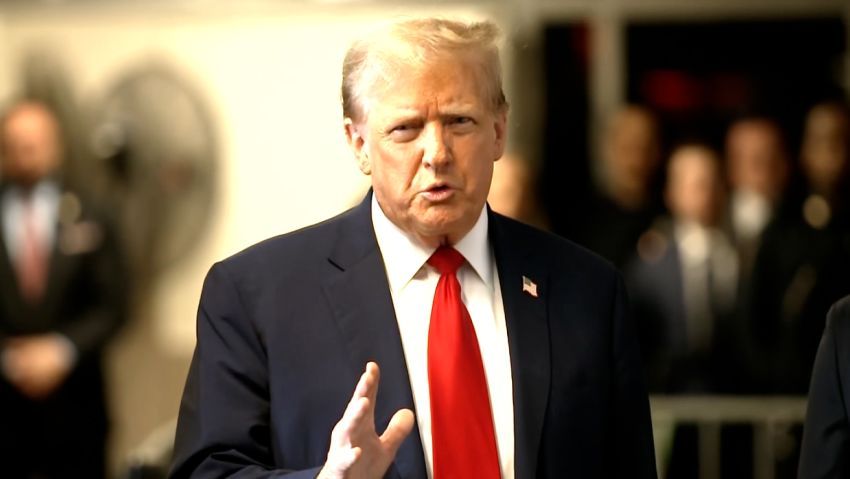CNN
—
As the first criminal case against a former U.S. president begins, 13% of people nationwide feel that Donald Trump is being treated the same as other criminal defendants. CNN poll powered by SSRS Finds out. Much of the country was split on whether he was treated more harshly (34%) or more leniently (34%) than other defendants.
The poll, which began rolling out days after the jury selection phase of the trial began on April 15, found that only 44% of Americans believe the jury selected for the case will reach a fair verdict, while 56% are skeptical. A fair result is on the cards. Trump's behavior during the hearing was seen as more inappropriate (42%) than appropriate (25%), with a third saying he didn't listen as much as he said.
The assessments of how things are playing out in the courtroom come as Americans mount accusations in an ongoing investigation into falsifying business records to cover up payments to adult film actress Stormy Daniels ahead of the 2016 election. That's irrelevant to his qualifications for the presidency (45%, compared to 39% last summer, before he was nominated as the Republican presidential nominee).
Three-quarters of voters who currently support Trump against President Joe Biden in the 2024 election say they would stick with him even if he were convicted of a crime, while 24% of Trump's supporters say a conviction might reconsider their support. Trump has been indicted in four separate cases, and the survey question asked whether he had been convicted of a crime without specifying a charge. About 12% of the total voters registered in the polls are likely to reconsider, enough to make the difference in a close race if he faces conviction in any of the four trials he could face between now and Election Day.
The political impact of a potential conviction is difficult to predict, but looking at the characteristics of Trump supporters who say they might reconsider offers some insight. They are younger than other Trump supporters (64% are under 50, compared to 37% of non-reconsiderers), less likely to be white (49% are people of color, 17% are non-reconsiderers), and are more likely to report being Biden voters in 2020 (among them 20% say they support Biden in 2020 and 6% of those who are undecided) are also willing to admit that Biden won enough votes to win the presidency. four years earlier (63% vs. 22% of those who did not reconsider). They are more likely to be politically apolitical (49% vs. 31%) and ideologically moderate (50% vs. 38%).
In short, they're members of groups that typically lean Democratic, but Biden isn't doing well in early polls in his race with Trump. Reflexive Trump supporters not guaranteed to support Biden if Trump faces conviction: A separate question earlier in the poll asked whether they would consider supporting Biden, with 81% of Trump supporters saying they might reconsider their opinion. They say they are unlikely to vote for the current president if he is convicted.

'Full 9-alarm fire': Honig reacts to transcript of testimony from Trump hush money probe
More broadly, a majority of Americans continue to say that the allegations against Trump in each of the four impeachments, if true, cast at least some doubt on his fitness for the presidency. If Trump's role in January 6, 2021, an attack on the US capital (47%) and attempts to subvert the 2020 election (44%) are true, more than 4 in 10 would qualify him. It says to delete. Absolutely presidential.
But views on the relevance of the cases to Trump's eligibility for office appear to be shifting somewhat. Along with the increased stake that the hush money charges are irrelevant to his eligibility for the presidency, there has been a small increase in the stake that the charges related to efforts to subvert the 2020 election and classified documents found at Trump's home are irrelevant. If his qualifications for the presidency prove true (37% now say each of the charges doesn't apply, up from 33% last summer).
In all three cases the shift comes mostly between Republican-leaning independents and those who lean neither party. The partisan record on how important each of the cases is to Trump's candidacy for the presidency remains largely locked, and independents from the Democratic Party are little changed. Considering the hush money charges, three-quarters of Republicans say they are now irrelevant, roughly even last summer, and among Democrats and Democratic-leaning independents, that is relatively stable at 13%. But among Republican-leaning independents, those rates who disagree with Trump's fitness rose from 57% to 73%, and the share of true independents rose from 29% to 45%.
Given the current investigation, most Americans feel Trump acted at least unethically, but few believe his actions were criminal: About a third said Trump's actions related to his business records related to those hush money transactions were illegal (33%), and 33% thought it was unethical but illegal. Not. A total of 12% said he did nothing wrong in the case. 1 in 5, 21%, say they are not sure.
Those views are similar to how Americans felt about the case shortly after the charges were announced last spring, with 37% saying Trump's actions in paying Stormy Daniels were illegal, 33% unethical and 10% saying he did nothing wrong.

Why is Trump so upset about what's happening outside of the NY courthouse?
Views on the investigation and its potential outcomes are divided along party lines, although independence is being checked on the trial itself.
A majority of Democrats and Democratic-leaning independents say Trump is treated more leniently by the criminal justice system (61%) than other defendants, while Republicans and Republican-leaning independents more often say he is treated more harshly than others (67%). Independents who do not lean toward either party lean toward his treatment more leniently (27%) than strongly (15%).
Lack of confidence in an elected jury reaching a fair verdict is deep among Republicans and Republican-leaning Americans (37% say they have no confidence), but even among Democrats and Democratic-leaning voters, 40% say they have little or no confidence. Confidence in the jury's ability to reach a fair verdict.
A majority of Democratic-aligned Americans say Trump's behavior during the investigation so far has been inappropriate (72%), though Republicans have not jumped to his defense. Only 46% of Republicans and Republican-leaning independents said Trump's behavior was appropriate, 15% said it was inappropriate and 39% said they didn't hear enough of what they had to say.
Overall, about half of all Americans (49%) say they follow news about the investigation very closely or closely, with Democratic-aligned Americans most likely to follow it closely (58%), followed by Republican-aligned adults (46%) and leaning either way. Independents were less attentive (35%).
The CNN poll was conducted by SSRS April 18-23 among a random national sample of 1,212 adults drawn from a probability-based panel. Surveys were conducted online or by telephone with face-to-face interviews. Results in the full sample have a margin of sampling error of plus or minus 3.4 percentage points.
CNN's Ariel Edwards-Levy and Ed Wu contributed to this story.